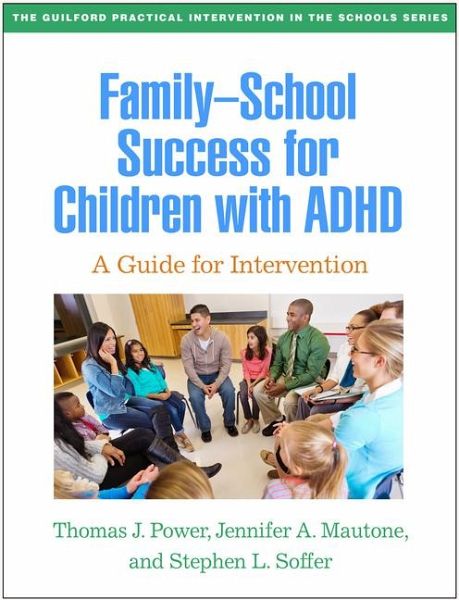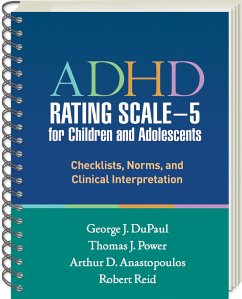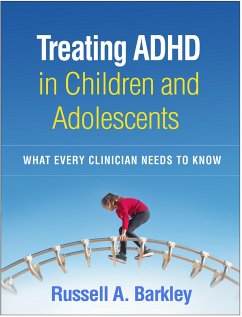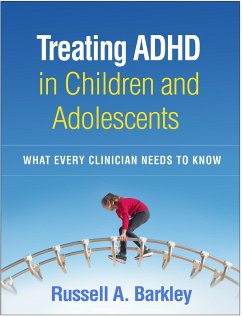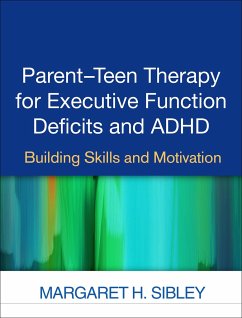Thomas J. Power (The Children's Hospital of PhiladelphiaUniversitJennifer A. Mautone (Children's Hospital of PhiladelphiaUniversitStephen L. Soffer (Children's Hospital of PhiladelphiaUniversity
Broschiertes Buch
Family-School Success for Children with ADHD
A Guide for Intervention
Versandkostenfrei!
Versandfertig in 2-4 Wochen
Weitere Ausgaben:

PAYBACK Punkte
25 °P sammeln!




Distilling decades of research, this practical manual presents an innovative intervention for families of 6- to 10-year-olds with attention-deficit/hyperactivity disorder (ADHD). Family-School Success (FSS) focuses on improving children's behavior and academic performance by strengthening parent-child, teacher-student, and family-school relationships.
Thomas J. Power, PhD, ABPP, is Professor of School Psychology in Pediatrics and Psychiatry at the Perelman School of Medicine at the University of Pennsylvania and Distinguished Endowed Chair in the Department of Pediatrics at Children's Hospital of Philadelphia (CHOP). Dr. Power has been Director of the Center for Management of ADHD at CHOP since 1999. He spent many years providing services to children and families coping with attention-deficit/hyperactivity disorder (ADHD) and has been dedicated to interprofessional training and intervention research throughout his career. Dr. Power is a past editor of School Psychology Review and was a member of the Society for Developmental and Behavioral Pediatrics committee that prepared the Clinical Practice Guideline for the Assessment and Treatment of Children and Adolescents with Complex ADHD. Jennifer A. Mautone, PhD, ABPP, is Associate Professor of School Psychology in Psychiatry at the Perelman School of Medicine at the University of Pennsylvania and Director of Primary Care Behavioral Health Research in the Department of Child and Adolescent Psychiatry and Behavioral Sciences at Children's Hospital of Philadelphia (CHOP). Dr. Mautone served as founding Co-Director of Healthy Minds, Healthy Kids, the integrated behavioral health in primary care program at CHOP. Her research and clinical practice focus on improving connections between systems of care (for example, families, schools, health systems) and increasing equitable access to and utilization of high-quality, culturally responsive behavioral health services for children and adolescents. Dr. Mautone has published over 50 peer-reviewed papers in scientific journals. Stephen L. Soffer, PhD, is Professor of Clinical Psychiatry at the Perelman School of Medicine at the University of Pennsylvania. At Children's Hospital of Philadelphia (CHOP), he is Co-Chief, Division of Outpatient Behavioral Health in the Department of Child and Adolescent Psychiatry and Behavioral Sciences; Training Director of the Psychology Internship Program; and a psychologist at the Center for Management of ADHD. In addition to caring for children and families, Dr. Soffer is actively involved in clinical teaching of psychology and psychiatry trainees. He has a long-standing commitment to developing and implementing suicide prevention initiatives, including expanding the use of evidence-based practice in youth suicide risk assessment and intervention in pediatric health care settings.
Produktdetails
- The Guilford Practical Intervention in the Schools Series
- Verlag: Guilford Publications
- Seitenzahl: 260
- Erscheinungstermin: 14. Mai 2024
- Englisch
- Abmessung: 263mm x 201mm x 17mm
- Gewicht: 596g
- ISBN-13: 9781462554362
- ISBN-10: 1462554369
- Artikelnr.: 69520955
Herstellerkennzeichnung
Libri GmbH
Europaallee 1
36244 Bad Hersfeld
gpsr@libri.de
Für dieses Produkt wurde noch keine Bewertung abgegeben. Wir würden uns sehr freuen, wenn du die erste Bewertung schreibst!
Eine Bewertung schreiben
Eine Bewertung schreiben
Andere Kunden interessierten sich für



